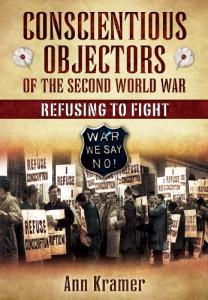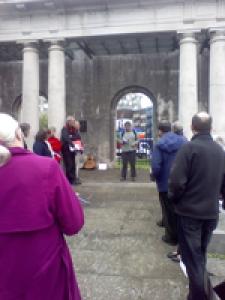Roy Prockter, who died suddenly on 18 June, aged 64, from a heart attack, was a chartered accountant and an active Quaker, who made both his professional skills and his commitment to nonviolence available to a number of radical pacifist groups and organisations.
One of his main concerns was the compulsory deduction of taxes contributing towards maintaining armed forces and providing lethal weapons.
He became active in the Peace Tax Campaign (now Conscience – Taxes for…
Hetherington, Bill
Hetherington, Bill
Bill Hetherington
Arlo Tatum played significant roles in the US, British and international pacifist movements. Born into a Quaker family in Iowa, he politely wrote in 1941, aged 18, to the US attorney general announcing his refusal to register for the draft – US conscription – imposed in advance of US entry to the Second World War. He was sentenced to three-and-a-half years in the Federal Correctional Institution, Sandstone, Minnesota, the youngest prisoner when he entered.
A natural baritone, Arlo, on…
At a time when many people in politics and the peace movement are focussing on the centenary of the start of the First World War, it may be thought inappropriate to bring out a book concerning the re-run 20 years later. Ann Kramer’s book, however, is a salutary reminder, not only of the irony of HG Wells’s 1914 book title (The War that Will End War) but also of the strength of the Second World War pacifist movement that largely had its roots in the struggle against the…
A £98,000 heritage lottery fund grant to the Peace Pledge Union (PPU) attracted some press attention in September. The grant will enable the PPU to carry out a two-year project to encourage communities and schools across Britain to research local conscientious objectors (COs) during the First World War. There was a debate in the Guardian, the Times, the Telegraph and even Le Monde (France) on using publicly-subscribed money in this way – rather than in…
Bill Hetheringon: The London ceremony was held on ICO Day itself, at the CO commemorative stone in Tavistock Square near Euston. There was an Amnesty International update on the long-standing harsh treatment of COs in Eritrea and South Korea, and the laying of white flowers commemorating 80 named objectors from as many countries around world over the past century.
The event ended with singing by the Raised Voices choir.
Janet King: In Birmingham, around 20 people came to the…
In the month leading up to 6 June a major pre-occupation was preparation for International Conscientious Objectors’ Day, 15 May.
For the past ten years I have prepared a list of representative COs of as many countries as I can find a name for, to be read out at the annual COs’ ceremony in Tavistock Square, London, whilst white flowers each bearing the name of a CO are laid on the Commemorative Stone. Each year further research expands the list, and this time there were 75 names,…
International Conscientious Objectors’ Day, 15 May, was marked by four events in Britain. At the CO Commemorative Stone in Tavistock Square, Bloomsbury, London, Norman Kember, post-WW2 CO and more recently a hostage in Iraq, spoke, before white carnations were laid to symbolise 70 named COs from countries around the world and over the past century.
Similar commemorations were held in Peace Gardens, Bath Row, Birmingham, on 11 May, and in the Peace Garden, St Peter’s Square,…
In the mid-1930s there was a ferment of pacifism in Britain. The First World War was a recent memory, and with the rise of Mussolini in Italy, Hitler in Germany, and the whole of Europe rearming, there was a popular yearning for a real way to peace.
One group who decided to do something about this was led by Humphrey Moore, a journalist in Wood Green, north London. He and others, including a young activist named Harry Mister, first met in late 1935 and decided to bring out a…
During the war, the Peace Pledge Union embarked upon negotiations of its own, with the object of obtaining a joint statement from British and Argentinian pacifists condemning the war.
Regrettably, this proved impossible, as the most accessible Argentinian pacifist, Adolfo Perez Esquivel, Nobel Peace laureate of 1980, whilst prepared to condemn the military action of both parties, refused to sign a statement that in any way set aside the Argentinian claim in favour of self-…
“I like… Peace News, the best of the weeklies”. So wrote Jack Overhill in his diary of daily life and activities as a shoe repairer and pacifist conscientious objector (CO) in Cambridge during the Second World War.
Born into a family of bootmakers, and ordered by his father to leave school at 14, Jack devoted all his spare time to self-education and attempts at novel-writing, as well as keeping a diary for most of his adult life. The 25 typescript volumes were deposited in the…
To us who were around at its beginning, it may be as shock to realise that CND is approaching its 50th birthday in 2008. A new review of its progress and achievements is therefore timely.
Kate Hudson, Chair of CND, took on a daunting task, and it is not surprising that more attention is given to the dramatic developments of the past 25 years than to the earlier ones - though that is no bad thing given the errors and omissions in the earlier history.
Kate does not actually…



